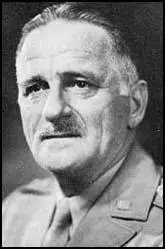Carl Spaatz

Carl Spaatz was born in the Boyertown, United States on 28th June, 1891. He attended the West Point Military Academy and graduated in 1914 (57/107) and joined the United States Army in Hawaii.
Spaatz went to Aviation School at San Diego, California and in 1916 became one of the Army's first 26 pilots. He served with the United States Air Service in France during the First World War. He was in charge of the aviation training centre at Issoudon but did have a short spell of combat duty when he shot down three German planes.
In 1929 Spaatz and his co-pilot, Ira Eaker, set a new endurance record after flying more than 150 hours aloft. They were also awarded the DFC for this achievement.
In 1940 Spaatz visited England to observe the Battle of Britain and the Blitz. After returning to the United States he was appointed head of the Air Material Command. In July 1941 he became deputy commander of the United States Air Force under Henry Arnold.
After the bombing of Pearl Harbor Spaatz was made head of the Air Force Combat Command. In January 1942 he began supplying bombers for duty with the Royal Air Force. Spaatz served in London from June until being sent to Algiers in December 1942, to establish the North West Africa Air Force.
In February 1943 Ira Eaker took over as head of the US Air Force in Algiers and Spaatz took control of the Western Desert Air Force.
Spaatz, along with Henry Arnold and Ira Eaker, was a strong advocate of daylight bombing raids. At a meeting at Casablanca, Spaatz, with the support of John Slessor, persuaded Winston Churchill to adopt a new strategy that became known as the Eaker Plan. It was agreed to launch a 24 hour bombing attack on Nazi Germany. Whereas the USAF would concentrate on daylight bombing the RAF would continue night bombing.
In December 1943 Spaatz was appointed commander of the USAF in Europe and was given responsibility for preparing for Operation Overlord. In March 1945 Spaatz was promoted to a four-star general and was put in charge of the final air assault on Japan.
In 1946 Spaatz replaced Henry Arnold as commander of the United States Air Force and the following year became the first chief of staff of the independent US Air Force (1947-48). Carl Spaatz died in Washington on 14th July 1974.
